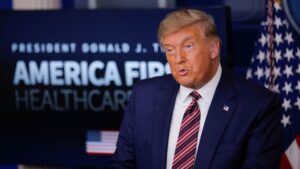The Pharma Landscape: Insights on Trump’s Administration and Industry Dynamics
As the pharmaceutical industry braces itself for the potential shifts under the Trump administration, the conversation is buzzing with anticipation and cautious optimism. After four years of navigating a challenging relationship with former President Biden’s hardline health care policies, pharmaceutical executives are hopeful that the new administration might foster a more supportive environment for drug innovation and accessibility.
Trump and Healthcare: A Focus on Costs
President Trump has consistently emphasized the need to lower healthcare costs for Americans. This approach aligns with widespread concerns about the exorbitant prices American patients face — often two to three times higher than those in other developed nations. With public opinion strongly favoring affordable prescription medications, the groundwork is laid for potential bipartisan solutions.
However, while Trump’s stance mirrors some of his predecessor’s focus on healthcare disparities, the pharmaceutical sector believes his administration will take a more business-friendly approach. One primary expectation is an increased emphasis on addressing the role of pharmacy benefit managers (PBMs), often viewed as gatekeepers who may inflate costs without providing sufficient value to either consumers or healthcare providers.
In an age where Drugmakers are navigating the complexities of drug pricing and insurance dynamics, Trump’s approach could potentially alleviate some of the burdens imposed by these intermediaries. For instance, reforming PBM practices and ensuring that discounts and rebates reach consumers at the pharmacy counter could significantly alter the economic dynamics for patients.
Industry Perspectives from the JPMorgan Health Care Conference
At the recent JPMorgan Health Care Conference, pharmaceutical CEOs expressed mixed feelings about the upcoming administration. While there are notable risks, many believe the opportunities to collaborate with Trump’s administration are greater. Pfizer CEO Albert Bourla remarked on the importance of proactive dialogue with the new leadership, implying that a collaborative relationship could lead to more favorable conditions for drugmakers.
Yet, unease looms regarding the appointment of high-profile figures like Robert F. Kennedy Jr. to the Department of Health and Human Services, especially given his controversial stance on vaccines. Experts warn that his views could potentially hinder public health efforts, prompting concerns about vaccination rates and overall health outcomes in the U.S.
The Push for PBM and Drug Price Reforms
Drugmakers’ optimism extends to the belief that PBM reforms are imminent. Following a frustrating lack of action from Congress on bipartisan reforms, the pharmaceutical industry is hopeful for change in 2023. Industry leader Stephen Ubl, CEO of the Pharmaceutical Research and Manufacturers of America, suggests that legislative momentum is building, potentially paving the way for the desires of drug manufacturers to become a reality.
The call to action remains clear: breaking the direct link between a drug’s list price and PBM compensation, ensuring patients see rebate benefits at the pharmacy, and enhancing transparency in PBM pricing practices. These reforms, if enacted, could drive down costs and make medications more accessible to consumers.
Medicare Drug Price Negotiations: A Tough Terrain
The future of Medicare’s ability to negotiate drug prices remains another critical issue. The Biden administration’s Inflation Reduction Act has sparked substantial debate within the pharmaceutical sector, with many arguing it restricts innovation and could lead to severe consequences for drug development.
While Trump may be inclined to reconsider aspects of the IRA, particularly around drug negotiations, dismantling these provisions is no small feat. Historical attempts to repeal significant healthcare regulations indicate that major reforms could face considerable legislative resistance.
Navigating Uncertainty: The RFK Jr. Factor
Perhaps one of the most significant unknowns for the industry is the influence of RFK Jr. on public health policy. Known for spreading misinformation regarding vaccines, concerns are rife that his position could jeopardize vaccine uptake and overall public trust in vaccines.
Pharmaceutical leaders like Bourla remain adamant that collaborative efforts can focus on shared health priorities while navigating this challenging landscape. There is a growing sentiment that Trump’s focus on cancer and chronic disease solutions could align with industry efforts to provide treatments that are both effective and profitable.
Conclusion: The Road Ahead
In a rapidly changing environment, the pharmaceutical industry is at a crossroads under the Trump administration. Executives remain cautiously optimistic, hoping to steer the conversation toward more manageable drug pricing and improved patient access, all while navigating the intricate web of policy implications.
At Extreme Investor Network, our focus remains on ensuring that our community is informed and prepared for these shifts. By monitoring legislative changes and engaging with industry leaders, we strive to provide our readers with insightful analysis and actionable strategies to navigate the evolving pharmaceutical landscape. Stay tuned as we continue to explore how these developments will impact investors, patients, and the wider healthcare ecosystem.

